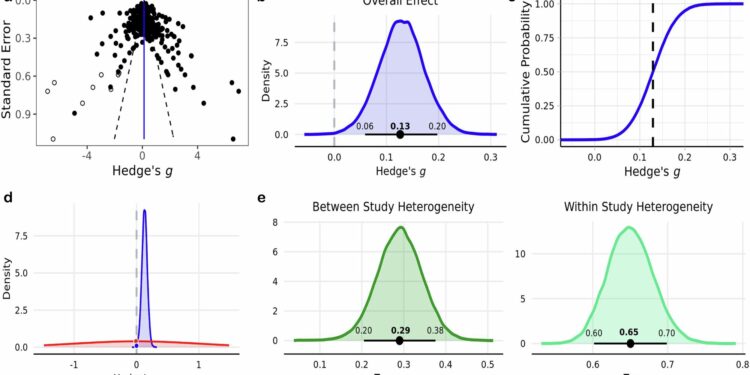Meta-analysis of the effect of acute exercise on general cognitive task performance. Credit: Communication psychology (2024). DOI: 10.1038/s44271-024-00124-2
Decades of exercise research data support the common view that regular, long-term training not only produces physical benefits, but also improves brain function. But what about single workouts? A team of scientists from UC Santa Barbara took a closer look.
Their study, “A systematic review and Bayesian meta-analysis provides evidence for an effect of acute physical activity on cognition in young adults,” was recently published in Communication psychology.
“One of the most consistent findings in the literature is that exercise interventions – something like a program you would participate in, say, three times a week for several months or years – improve cognition and may even promote neurogenesis (the process by which new neurons form in the brain),” said Barry Giesbrecht, professor in the Department of Psychological and Brain Sciences and lead author of the study. “But studies looking at the effects of single, acute bouts of exercise are much more mixed.”
Focusing on topics ages 18 to 45, first author Jordan Garrett, who earned his Ph.D. department in June — and the team reviewed thousands of exercise studies published between 1995 and 2023 to determine consistent trends in the literature. Based on the results of their modeling approach, cycling and high-intensity interval training (HIIT) produced the most consistent effects in terms of improving memory, attention, executive functions, information processing and other cognitive functions.
“We found that vigorous activities produced the greatest effects,” Giesbrecht said. “Furthermore, the effects were stronger in studies that tested cognition after exercise, as opposed to during exercise. And finally, the effects of exercise lasting less than 30 minutes were greater than those that lasted beyond 30 minutes Our work showed the strongest evidence for a positive effect of single exercise sessions on cognition and that this evidence was influenced by various factors.
Also among their findings, the team discovered that executive functioning was the key cognitive domain impacted by vigorous exercise, such as HIIT protocols.
“I think the other intriguing result is that the overall effect of a single exercise session was generally small,” Giesbrecht said, noting that in addition to variability between experiments, improvements may also be small because they are generally measured. when physical activity is not related to the cognitive task. This raises the “intriguing” hypothesis, he added, that using tasks that require the integration of the actions of our body and cognitive systems could result in more pronounced benefits.
Giesbrecht and his team plan to test this idea “by combining laboratory tasks and real-world activities,” he said.
More information:
Jordan Garrett et al, A systematic review and Bayesian meta-analysis provides evidence for an effect of acute physical activity on cognition in young adults, Communication psychology (2024). DOI: 10.1038/s44271-024-00124-2
Provided by University of California – Santa Barbara
Quote: Exercise bursts boost cognitive function, neuroscientists say (October 15, 2024) retrieved October 15, 2024 from
This document is subject to copyright. Except for fair use for private study or research purposes, no part may be reproduced without written permission. The content is provided for informational purposes only.



